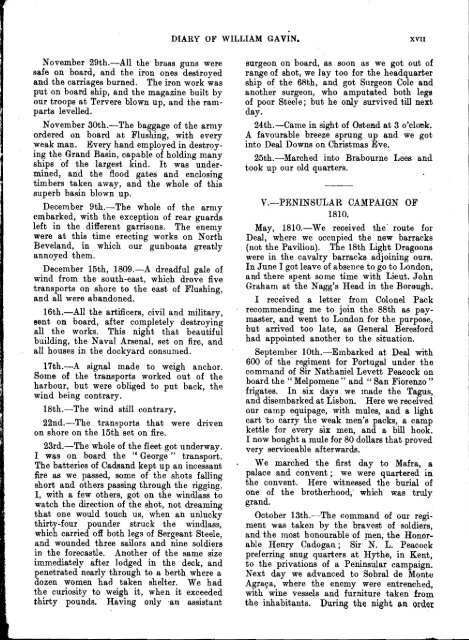Create successful ePaper yourself
Turn your PDF publications into a flip-book with our unique Google optimized e-Paper software.
DIARY OF WILLlAM GA VIN.<br />
XVII<br />
November 29th.-All the brass guns were<br />
safe on board, and the iron ones destroyed<br />
and the carriages burned. <strong>The</strong> iron work was<br />
put on board ship, and the magazine built by<br />
our troops at.Tervere blown up, and the ramparts<br />
levelled.<br />
November 3Oth.-<strong>The</strong> baggage of the army<br />
ordered on board at Flushing, with every<br />
weak man. Every hand employed in destroying<br />
the Grand Basin, oapable of holding many<br />
ships of the largest kind. It was undermined,<br />
and the flood gates and enclosing<br />
timbers taken away, and the whole of this<br />
superb basin blown up.<br />
December 9th.-<strong>The</strong> whole of the army<br />
embarked, with the exc~ption of rear guards<br />
left in the different garrisons. <strong>The</strong> enemy<br />
were at this time erecting works on North<br />
Beveland, in which our gunboats greatly<br />
annoyed them.<br />
December 15th, 1809.-A dreadful gale of<br />
wind from the south-east, which drove five<br />
transports on shore to the east of Flushing,<br />
and all were abandoned.<br />
16th.-All the artificers, civil and military,<br />
8ent on board, after completely destroying<br />
all the works. This night that beautiful<br />
building, the Naval Arsenal, set on fire, and<br />
all houses in the dockyard consumed.<br />
17th.-A signal made to weigh anchor.<br />
Some of the transports worked out of the<br />
harbour, but were obliged to put back, the<br />
wind being contrary.<br />
18th.-<strong>The</strong> wind still contrary.<br />
22nd.-<strong>The</strong> transports that were driven<br />
on shore on the 15th set on fire.<br />
23rd.-<strong>The</strong> whole of the fleet got underway.<br />
I was on board the "George" transport.<br />
<strong>The</strong> batteries of Cadsand kept up an incessant<br />
fire as we passed, some of the shots falling<br />
short and others passing through the rigging.<br />
I, with a few others, got on the windlass to<br />
watch the direction of the shot, not dreaming<br />
that one would touch us, when an unlucky<br />
thirty-four pounder struck the windlass,<br />
which carried off both legs of Sergeant Steele,<br />
and wounded three sailors and nine soldiers<br />
in the forecastle. Another of the same size<br />
immediately after lodged in the deck, and<br />
penetrated nearly through to a berth where a<br />
dozen women had taken shelter. We had<br />
the ouriosity to weigh it, when it exceeded<br />
thirty pounds. Having only 'an assistant<br />
surgeon on board, as soon as we got out of<br />
range of shot, we lay too for the headquarter<br />
ship of the 68th, and got Surgeon Cole and<br />
another surgeon, who amputated both legs<br />
of poor Steele; but he only survived till next<br />
day.<br />
24th.-Came in sight of Ostend at 3 o'clo.,k.<br />
A favourable breeze sprung up and we got<br />
into Deal Downs on Christmas Eve.<br />
25th.-Marched into Brabourne Lees and<br />
took up our old quarters.<br />
V.-PENINSULAR CAMPAIGN OF<br />
1810.<br />
May, 1810.-We received the' route for<br />
Deal, where we occupied the new barracks<br />
(not the Pavilion). <strong>The</strong> 18th Light Dragoons<br />
were in the cavalry barracks adjoining ours.<br />
In June I got leave of absence to go to London,<br />
and there spent some time with Lieut. John<br />
Graham at the Nagg's Head in tJ:te Bor()ugh.<br />
I received a letter from Colonel PaCk<br />
recommending me to join the 88th as paymaster,<br />
and went to London for the purpose,<br />
but arrived too late, as General Beresford<br />
had appointed another to the situation.<br />
September lOth.-Embarked at Deal with<br />
600 of the regiment for Portugal under the<br />
command of Sir Nathaniel Levett Peacock on<br />
board the" Melpomene" and " San Fiorenzo"<br />
frigates. In six days we made the Tagus,.<br />
and disembarked at Lisbon. Here we received<br />
our camp equipage, with mules, and a light<br />
cart ~to carry the weak men's packs, a camp<br />
kettle for every six men, and a bill hook.<br />
I now bought a mule for 80 dollars that proved<br />
very serviceable afterwards.<br />
We marched the first day to Mafra, a<br />
palace and convent; we were quartered in:<br />
the convent. Here witnessed the burial of<br />
one of the brotherhood; which was truly<br />
grand.<br />
October 13th.-<strong>The</strong> command of our regi~<br />
ment was taken by the bravest of soldiers,<br />
and the most honourable of men, the Honorable<br />
Henry Cadogan; Sir- N. L. Peacock<br />
preferring snug quarters at Hythe, in Kent,<br />
to the privations of a Peninsular campaign.<br />
Next day we advanced to Sobral de Monte<br />
Agraga, where the enemy were entrenched,<br />
with wine vessels and furniture taken from<br />
the inhabitants. During the night aD. Qrder


